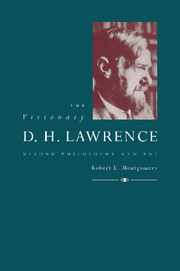Book contents
- Frontmatter
- Contents
- Acknowledgments
- 1 Introduction
- 2 Flesh, Word, and Holy Ghost: Lawrence and Schopenhauer
- 3 The passionate struggle into conscious being: Lawrence and Nietzsche
- 4 “A dry soul is best”: Lawrence and Heraclitus
- 5 The science of the soul: Lawrence and Boehme
- 6 Conclusion: Romanticism and Christianity
- Bibliography
- Index
2 - Flesh, Word, and Holy Ghost: Lawrence and Schopenhauer
Published online by Cambridge University Press: 08 January 2010
- Frontmatter
- Contents
- Acknowledgments
- 1 Introduction
- 2 Flesh, Word, and Holy Ghost: Lawrence and Schopenhauer
- 3 The passionate struggle into conscious being: Lawrence and Nietzsche
- 4 “A dry soul is best”: Lawrence and Heraclitus
- 5 The science of the soul: Lawrence and Boehme
- 6 Conclusion: Romanticism and Christianity
- Bibliography
- Index
Summary
WILL AND IDEA
Jessie Chambers says that Lawrence “seemed to read everything” (123). In addition to an impressive array of major and minor novelists, poets, playwrights, and essayists, he educated himself in philosophy. Not only did he make himself truly contemporary with the latest philosophical thought in the form of figures like James, Haeckel, Spencer, and Huxley, but he also read a number of other philosophers like Locke, Berkeley, and Mill (Chambers 112). There may well have been others. Jessie points out that her “account of Lawrence's reading makes no claim to be exhaustive … He certainly read much more than is indicated here” (123). Her account makes clear, however, that there was one philosopher in particular who had a singular impact on Lawrence:
It was during his second year in College that Lawrence began to read philosophy. I cannot be sure whether he read Kant during this period, but he advised one of my brothers to give me Schopenhauer's Essays for my birthday, and read The Metaphysics of Love aloud to us. He translated the Latin quotations in pencil in the margin … This essay made a deep impression upon him… He followed the reasoning closely, as always applying it to himself, and his own case… Schopenhauer seemed to fit in with his mood. He thought he found there an explanation of his own divided attitude and he remained under the influence of this line of reasoning for some time.
(111–12)- Type
- Chapter
- Information
- The Visionary D. H. LawrenceBeyond Philosophy and Art, pp. 43 - 72Publisher: Cambridge University PressPrint publication year: 1994



